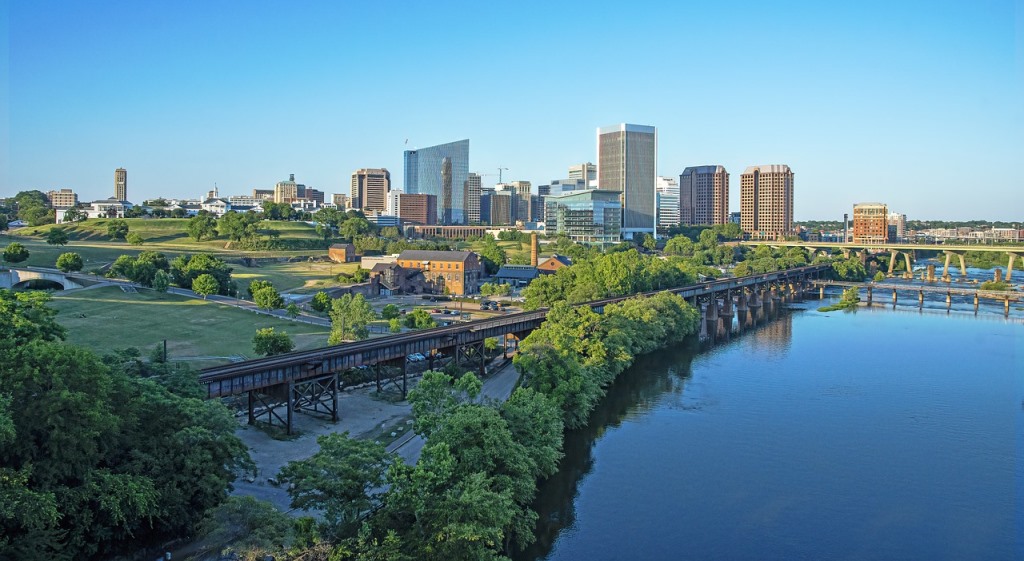The recently-adopted citywide master plan for revitalization, Richmond 300: A Guide for Growth, was recently awarded the 2021 Daniel Burnham Award for a Comprehensive Plan from the American Planning Association (APA). This award recognizes an innovative plan that helps create a more prosperous and equitable community for current and future residents.
Richmond’s plan certainly focuses on the right actions, boosting affordable housing and public transit while concentrating economic growth on repurposing, renewing and reconnecting old industrial areas (AKA the 3Re Strategy). The City Center Small Area Plan portion of the master plan emphasizes redeveloping vacant and under-utilized parcels in Downtown Richmond, most of which are owned by the city.
“Richmond is a prime example of how planning can help a community begin to overcome past wrongs like redlining and practices that unfairly excluded specific populations from access to opportunity,” said Kristen Asp, AICP, 2021 APA awards jury chair. “This plan, combined with their laser focus on implementation, is an example for other communities around the country on how planning can and should address systemic racism.”
That all sounds wonderful, of course, but let’s not forget that some 90% of cities’ “master plans”, “comprehensive plans”, “strategic plans” and “revitalization plans” are never implemented. As documented in the recent book, RECONOMICS: The Path To Resilient Prosperity, plans are too often viewed as an end in themselves: creating a plan is frequently confused with action and progress.
The act of planning is fine, but plans more often get in the way of revitalization, rather than advancing it. There are many reasons for that, but the most crucial is that places focus on the plan, rather than on the process. The renewal process is what produces results: a plan is just a document…an ignored document, in most cases.
Years of work by City staff, as well as thousands of residents, business owners, and other community members, resulted in the adoption of Richmond 300 in December 2020. The Department of Planning and Development Review (PDR), and specifically the Office of Equitable Development, are now working to implement the recommendations of the plan, which seek to achieve the outlined vision over the next 20 years.
“This recognition of Richmond 300 by the American Planning Association is a testament to all the hard work over many hours by the thousands of community members that participated in this planning process,” said Mayor Levar Stoney.
“Overcoming years of divestment, specifically in our Black and Brown communities, is an immense task, and Richmond 300 steps away from the status quo and provides bold yet sound approaches to combatting inequities by adopting to our changing environment, addressing affordable housing needs, and fostering economic inclusion,” he added.
The Plan sets the overall vision for the future of the city and provides high-level recommendations to create a more equitable, sustainable, and beautiful Richmond for its 300th birthday in 2037. The Plan outlines specific recommendations across five topics: high-quality places, equitable transportation, diverse economy, inclusive housing, and thriving environment.
“We’re grateful and humbled to serve as trusted advisors to the city for Richmond 300 and are thrilled the plan is receiving this honor from APA,” said Mike McIntyre, program director with AECOM, lead consultant firm for Richmond 300. “From the start, our goal was to break the mold and build this plan with maximum transparency and community input. This award belongs to every person who got involved, lent their voice, and helped shape Richmond 300 into something we can all be proud of. We’re excited for our city’s next chapter!”
The sheer breadth and length of any comprehensive plan can make it difficult to execute; therefore, Richmond 300, outlines 6 Big Moves to deliberately advance over the next 5 years:
- Re-write the Zoning Ordinance;
- Re-Imagining Priority Growth Nodes;
- Expand Housing Opportunities;
- Provide Greenways and Parks for All;
- Reconnect the City; and
- Realign City Facilities
“Creating Richmond 300 is the first step in envisioning a more equitable Richmond,” said Maritza Mercado Pechin, AICP, PDR Deputy Director and Manager of the Office of Equitable Development. “I am looking forward to continuing to engage the Richmonders as we collectively implement the recommendations in the plan.”
Photo of Richmond by Bruce Emmerling from Pixabay.

